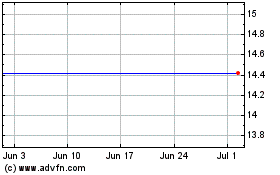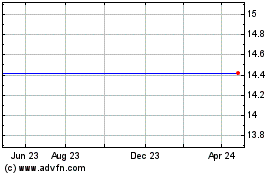Hijacking': From the Theft of Bootleg Liquor to Taking Jets in Flight
May 28 2021 - 4:49PM
Dow Jones News
By Ben Zimmer
Linguist and lexicographer Ben Zimmer analyzes the origins of
words in the news. Read previous columns here.
When Belarus President Alexander Lukashenko forced a Ryanair
plane to land in order to arrest a dissident journalist who was on
board, international outrage was swift. The CEO of Ryanair, based
in Ireland, called the incident "a state-sponsored hijacking."
Irish Prime Minister Micheál Martin and several other European
Union leaders echoed the term.
White House press secretary Jen Psaki was more cautious. "I
don't have a new definition of what happened here," she said,
adding that the White House, while condemning the action, was "not
legally ready to change any of the existing language" regarding the
term "hijacking."
Under a narrow definition of "hijacking," what happened to the
Ryanair flight might not count. It didn't fit the typical scenario
in which someone commandeers a plane from the inside, such as by
coercing the pilot at gunpoint. (The flight, bound for Vilnius, was
forced to divert to Minsk because authorities from Belarus claimed
there was a bomb threat. The journalist Roman Protasevich was
arrested on arrival.)
The meaning of "hijacking" has never been entirely
straightforward, and the term's origins, while dating back a little
over a century, perplex etymologists to this day.
Last December, Gerald Cohen, a professor at Missouri University
of Science and Technology, devoted an issue of his "Comments on
Etymology" periodical series to the latest research into the
emergence of the verb "hijack." Several of the earliest known
examples in print are clustered in Oklahoma in the 1910s. Oklahoma
had recently become a state and enshrined the prohibition of
alcohol in its constitution, which led to the widespread
bootlegging of liquor -- and the frequent robbery of liquor from
vehicles transporting it.
An article in the Dec. 13, 1915 issue of the Record-Herald in
Miami, Okla., first discovered by Stephen Goranson, a researcher at
Duke University, reports that "a new word has been coined" to
describe "free-lance bandits" on the roadways holding up those
transporting illicit liquor: "hi-jackers." (Confusingly, the
article also refers to them as "hi-packers," but that may be a
typo.)
The article suggests these "hi-jackers" were arriving in
Oklahoma from Missouri, which would accord with a theory Mr. Cohen
has proposed for the term's origin. In southwest Missouri, some
locals claim that the word "hijack" arose in the context of zinc
mining. Zinc was locally called "jack," so "hi-jack" could refer to
high-grade zinc ore that some miners pilfered.
While the evidence for that theory is scant, it's clear that
once the term caught on for booze bandits in Oklahoma, it spread to
other kinds of holdups. A 1916 magazine article on " Oil Field
Talk" defined "high-jack" as "a bandit or stick-up man (they are
plentiful in the oil fields)."
In the Prohibition era, "hijacking" became firmly associated
with stealing bootlegged liquor or smuggled goods, often by seizing
a vehicle on the highway. The theory favored by Mr. Goranson is
that "hijacking" is best understood as originally referring to
"highway jacking," with "jack" meaning "lift" or "hold up."
As early as 1948, "hijacking" got applied to seizing vehicles in
the sky. That's when, as the Edmonton Journal put it, "twenty
anti-Communist Czechs...hijacked a transport plane in mid-air and
flew it to the U.S. zone of Germany." A 1961 headline in the New
York Mirror introduced a new portmanteau word for the phenomenon:
"Pan Am Jet Skyjacked to Havana."
After "skyjacking" came other blends like "carjacking" and
"yacht-jacking," both dating to the early 1970s. The digital age
has given us "cyberjacking," in which hackers remotely take control
of computer systems, as well as "clickjacking," or tricking a
website user into clicking on a hyperlink. A Facebook-specific kind
of clickjacking is "likejacking," in which scammers fool a user
into "liking" a post or page.
The word "hijack" has been commandeered for all sorts of
purposes. Should we call that "hijack-jacking?"
(END) Dow Jones Newswires
May 28, 2021 16:43 ET (20:43 GMT)
Copyright (c) 2021 Dow Jones & Company, Inc.
Ryanair (LSE:RYA)
Historical Stock Chart
From Mar 2024 to Apr 2024

Ryanair (LSE:RYA)
Historical Stock Chart
From Apr 2023 to Apr 2024
